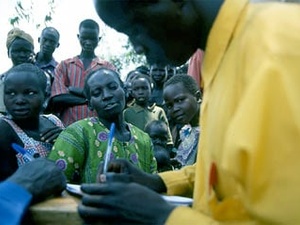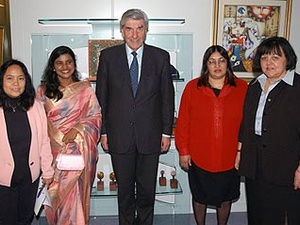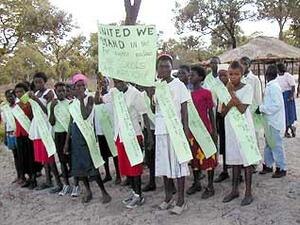High Commissioner in Afghanistan
High Commissioner in Afghanistan
High Commissioner Ruud Lubbers ended his two day visit to Kandahar today following a visit to UNHCR's temporary camp at Zhare Dasht and several makeshift sites sheltering internally displaced Afghans encamped around the southern border town of Spin Boldak. He was joined by Afghanistan's Minister of Repatriation, Enayatullah Nazari. The trip marked the first time a senior government official has travelled to the south to review the situation of some of the 400,000 displaced people in the region.
UNHCR is in the process of shifting displaced Afghans stranded in the squalid Pakistani border sites to Zhare Dasht. The new temporary camp an hour west of Kandahar now shelters more than 2,000 people who have been voluntarily moved from the "waiting area" site at Chaman, where they have been stuck for more than six months since Pakistan closed its border. Zhare Dasht is meant to be an interim site, where up to 60,000 displaced Afghans can be properly assisted with water, health care, food and shelter until the Afghan government can find a solution to their plight.
Travelling in Kandahar Province with Minister Enayatullah Nazari, High Commissioner Lubbers met ethnic Pashtuns who fled the north due to violence and fears of attacks following the fall of the Taliban late last year, and impoverished Kuchi nomads who have lost their flocks of sheep and goats due to the drought that still afflicts much of southern Afghanistan. The displaced Afghans were told that the government would send officials from northern Afghanistan to meet with them, and that UNHCR would organize go-and-see visits so that they could check on conditions in their home regions. But they were warned that solving the problem of displacement would not go quickly, especially for the many Afghans who have lost their livelihoods due to the drought.
Mr. Lubbers is now back in Kabul, where he is meeting with staff on UNHCR's repatriation programme for the coming year. So far some 1.6 million Afghans have returned home with UNHCR assistance since March - more than double the number of people UNHCR expected to return from Pakistan and Iran when the programme began in March.
On Sunday, during a meeting with the High Commissioner, President Hamid Karzai thanked UNHCR for its assistance in the massive repatriation effort. But both Karzai and High Commissioner Lubbers agreed that the success of returns would quickly turn into failure if Afghans cannot reintegrate in their homeland.
Lubbers said UNHCR is working to better link return, reintegration, rehabilitation and reconstruction - what he calls the "4 Rs" - with development agencies such as the UN Development Programme and the World Bank taking responsibility for the latter stages. We are already working with the Afghan Ministries of Urban Affairs, Rural Development, and Repatriation.
Even prior to the 1979 Soviet invasion, Afghanistan was one of the least developed countries in the world. In the last two decades the infrastructure and services throughout the country have worsened considerably - the vast majority of rural Afghans have no access to safe drinking water or medical care. To ensure that Afghans return home, and have the means to stay put, a continued humanitarian and long-term development programme will have to be rolled out.






